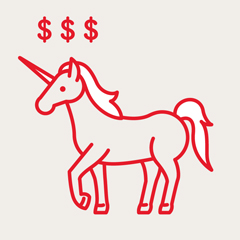In European folklore, the unicorn is a beast of legend. But now, investors use the word to describe companies that attain a “legendary” $1-billion market valuation before they are 10 years old.
These business unicorns – so named because they are exceedingly rare – comprise 39 software companies established since 2003. Facebook, Twitter and YouTube are among the best known.
Nico Lacetera, a professor at the Institute for Management and Innovation at U of T Mississauga, says it’s hard to predict which companies will become the next unicorns because they make up such a tiny fraction of all startups – less than one tenth of one per cent. But their success derives from a common source, he says: most have harnessed the Internet to quickly build massive audiences for their products or services.
It remains to be seen what longterm impact unicorns have on the business ecosystem. Most are not yet as profitable as long-time corporate workhorses such as Microsoft, which in 2013 out-earned Facebook by more than 10 to 1.
Recent Posts
People Worry That AI Will Replace Workers. But It Could Make Some More Productive
These scholars say artificial intelligence could help reduce income inequality
A Sentinel for Global Health
AI is promising a better – and faster – way to monitor the world for emerging medical threats
The Age of Deception
AI is generating a disinformation arms race. The window to stop it may be closing





